The Namesake
A review of "The Namesake" by Jhumpa Lahiri
“At times, his name, an entity shapeless and weightless, manages nevertheless to distress him physically, like the scratchy tag of a shirt he has been forced to permanently wear. At times, he wishes he could disguise it, shorten it somehow, the way the other Indian boy in his school, Jayadev, had gotten people to call him Jay. But Gogol, already short and catchy, resists mutation.”
- pg. 76
In an ideal world, his name wouldn’t have been ‘Gogol.’ It was supposed to be a placeholder - a nickname, or as they call it in Bengali culture - a pet name. Amidst the pressure to legally name their son in the foreign land of America - without the familiar hands of culture postponing this ritual, Ashoke and Ashima (his parents) settle for ‘Gogol.’ A pet name given the privileged status of ‘proper name.’
“… good names appear on envelopes, on diplomas, in telephone directories, and in all other public places… Good names tend to represent dignified and enlightened qualities. Ashima means she who is limitless, without borders… Pet names have no such aspiration. Pet names are never recorded officially, only uttered and remembered… Often in one's infancy, one answers unwittingly to dozens of pet names, and one eventually sticks.” - pg. 26
Nikolai ‘Gogol’ is the name of a Russian author closer to Ashoke’s heart than many around him will ever know. A name that will not only symbolise the books he held so dear in his youth but, crucially, also recalibrate one of his most unsettling of memories - that of a train accident that almost ended his life. The anguish from which tragedy is immortalized in his limp, a reminder that it was the cramped pages of ‘The Overcoat’ - a book by Nikolai Gogol, that alerted the rescuers that Ashoke was still alive. For him, the horrid scenes of that night began and ended with Gogol’s words in his palms. The miracle of his (almost upended) life was, therefore, indelibly linked to ‘Gogol’. Now, upon the birth of his son, it dawns on him that even this miracle of life that he is so proud to call his son can share the weight of Gogol’s name.
“… the perfect pet name for his son occurs to Ashoke. He remembers the pages crumbled tightly in his fingers, the sudden shock of the lantern’s glare in his eyes. But for the first time, he thinks of that moment not with terror, but with gratitude.” - pg. 28
Considering that ‘Gogol’ sounds like the name of a villain in Mortal Kombat (sorry, not sorry), it is unsurprising that Gogol doesn’t like his name. In his teenage years, he grows increasingly uneasy with it. It is America, and he needs a cool name. Or, at the very least, an exotic name - one that sparks intrigue. ‘Gogol’ is neither.
“This writer he is named after - Gogol isn’t his first name. His first name is Nikolai. Not only does Gogol Ganguli have a pet name turned good name, but a last name turned first name. And so it occurs to him, that no one he knows in the world, in Russia or India or America or anywhere, share his name. Not even the source of his namesake.” - pg. 78
These feelings are not just a phase - or one of those transient rebellious feats dotted through puberty. It is bigger - a loathing that pungently sticks to him like beads of sweat. As the years hobble on, he continues to see it as an unwelcome silhouette of his existence. It is this rocky relationship with his name that anchors the book. From its sore connection to his father to the lives he carves after legally ditching it for ‘Nikhil,’ the name ‘Gogol’ continues to follow him like a stubborn shadow. He straddles between the two identities - one that is an unwelcome relic from the past, and the other, an archway to seeming new beginnings.
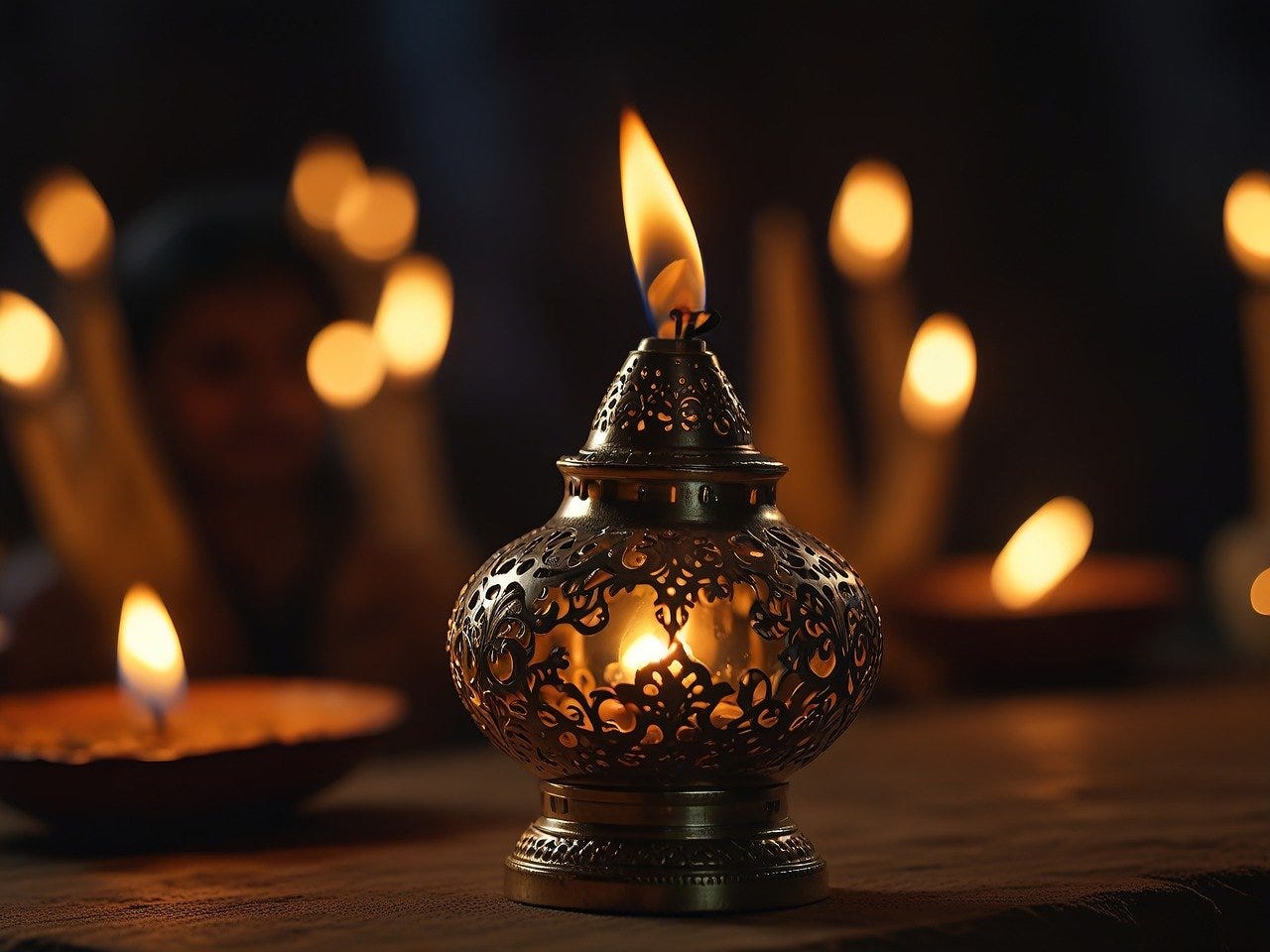
The Namesake was a good read. Not up there with my favourites of the year, but probably within touching distance. It wasn’t as gripping as I usually like my stories, which are often mysteries seasoned with handfuls of “Oh my goodness, what just happened?” scenes. The Stay With Me or Seven Moons of Maali Almeida type of novels.
Like most books that follow the lives of (intergenerational) migrants, The Namesake is littered with nuanced commentary on culture, identity, and belonging. This is most seen in the generational gap between Gogol’s parents and their children. Their understanding of ‘home’ is not only different, but it shapeshifts over time, teetering between two worlds.
“He knows that deshi, a generic word for a countryman, means Indian, knows that his parents and all their friends always refer to India simply as desh. But Gogol never thinks of India as desh. He thinks of it as Americans do, as India.” - pg. 118
Central to Gogol’s story, within his tryst with his (pet?) name, is the tale of his parents. The book starts with Ashima in the hospital - alone in a country without anyone she has known throughout her life - about to give birth to Gogol. Her mind races with fears and anxieties - for her, her husband, and the son she is bringing into this desolate world.
“Without a single grandparent or parent or aunt or uncle by her side, the baby’s birth, like most everything else in America, feels somehow haphazard, only half true. As she strokes and suckles and studies her son, she can’t help but pity him. She has known a person entering the world so alone, so deprived.” - pg. 24
Because you meet Ashoke and Ashima pretty early in the book, you watch them grow. You are with them when they have their second child - Sonia. When they nurse their grief miles away from most of those they hold dear. You watch them try to mediate the palpable gulf between them and (both) the places they call home. In the end, you wonder where home is for them. Is it America? Is it India? Is it the Indian community they have cultivated in America?
One of the most exciting parts of the book was how this backdrop, coupled and extenuated by the delicate relationship with his name, shaped Gogol’s (intimate) relationships. If you (have) ever read The Namesake, I am interested to know what you thought of the different intimate relationships Gogol had with Ruth, Maxine, Bridgette, to Moushumi. Why do you think they were so different? Was it an age thing? An identity thing? A mix of the two? Something else?
I think I was drawn to this because of how each of these was portrayed. I kept having a feeling that the beginnings of his relationships with all these (bar Moushumi) were underexplored. At least compared to Moushumi, all the others seemed not necessarily rushed but maybe, for lack of a better word, shallow? It is only with Moushumi that we see Gogol fall in love. The journey behind it. Reading these patches of the story, I wondered whether he felt the same way in his previous relationships or whether there was something qualitatively different with Moushumi. I mean yes, there was probably a difference in the relationships, but I mean the process of how he fell in love. How he developed the feelings. I don’t even know if I am making sense here. It is just that we never get this point of view, at least not in its clearest form.
Despite this, I loved the book’s multiple points of view - from Ashoke, Ashima, Gogol to Moushumi. I absolutely like it when I understand the context and thought process behind a character’s (especially neurotic) actions. Like, Yes! you’re still a walking ball of chaos, but at least now I know why! Any book that does this always has a wee little space in my heart.
Overall, though not as riveting as my other reads, The Namesake is a well-put-together story of a boy’s rickety relationship with his name and identity - with the sobering tales that came before it and the trying ones that come after. Before I leave you, I should point out that this book won the Pulitzer Prize and has received tons of rave reviews, so there is a high chance that you will enjoy it way more than I did! Oh, and it has a movie adaptation as well.
<iframe width="560" height="315" src="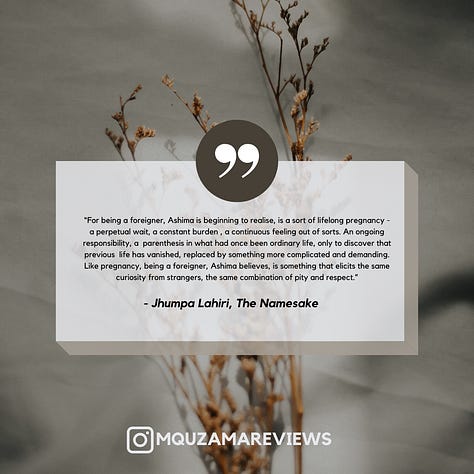
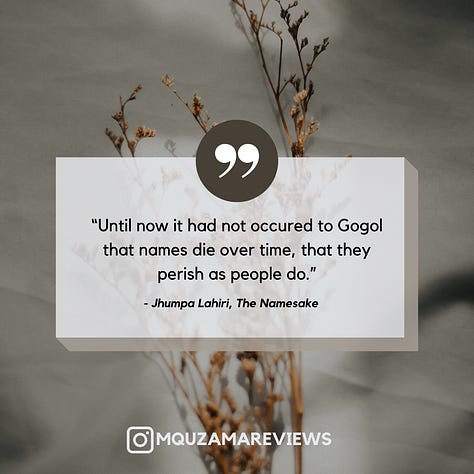
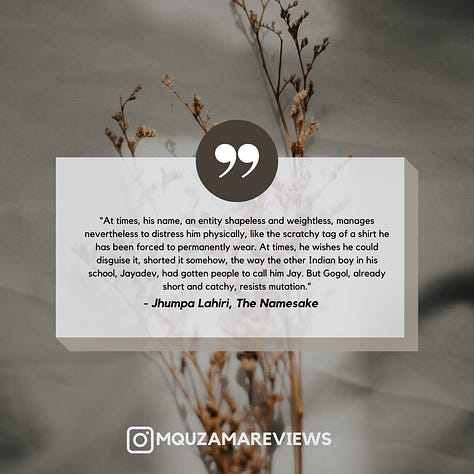
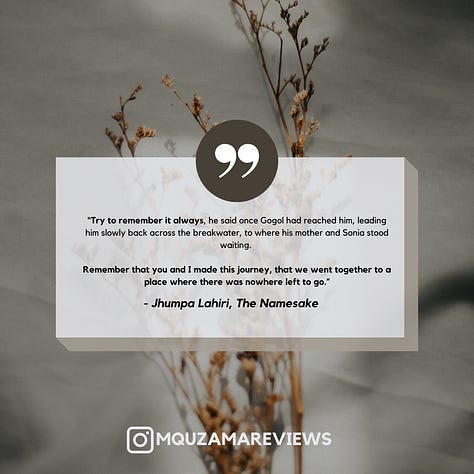
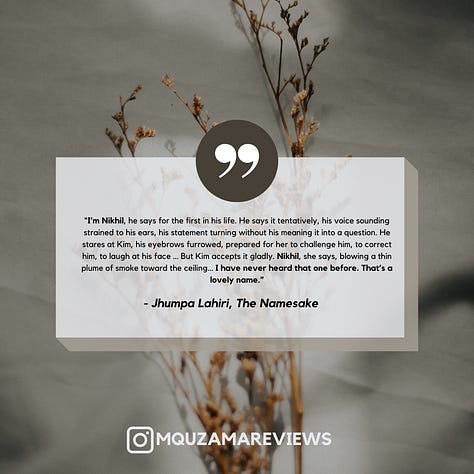
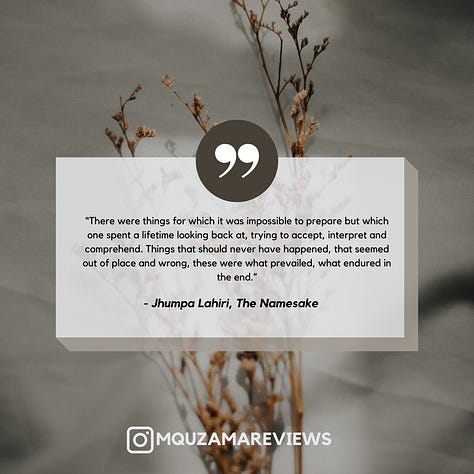


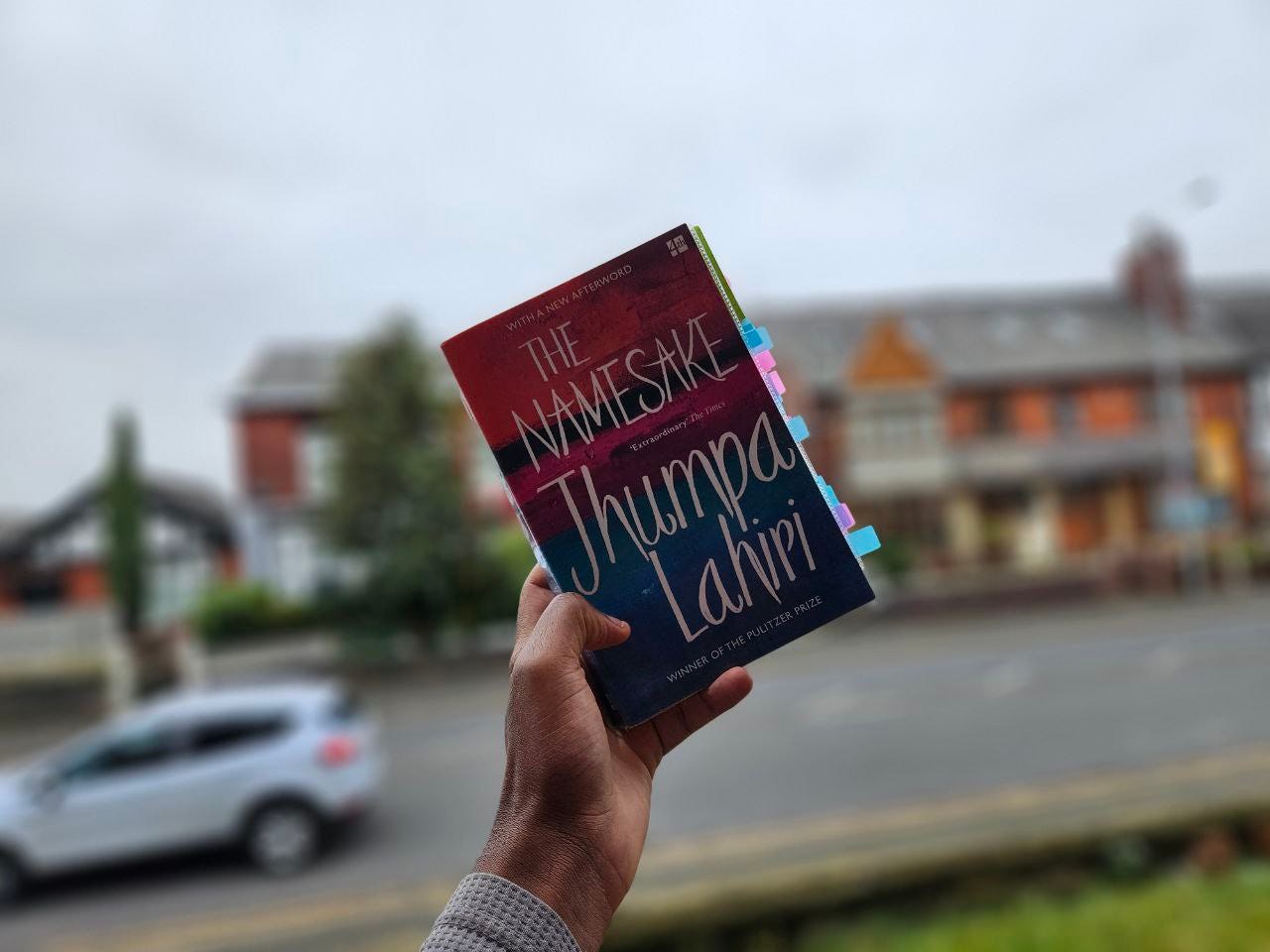
I get it why it's your least fave. Lol great review 👍🏾